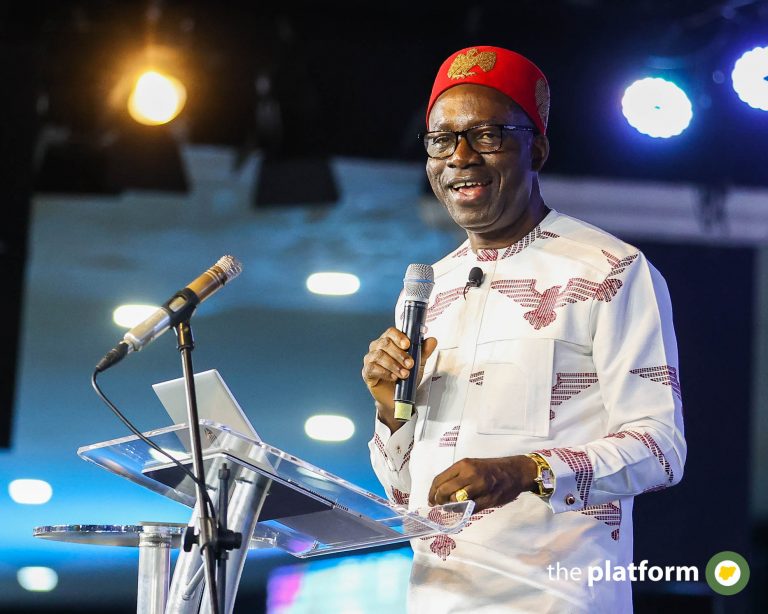At the June 12 edition of The Platform Nigeria, hosted by Pastor Poju Oyemade and The Covenant Nation in Lagos, Anambra State Governor and former Central Bank of Nigeria Governor, Professor Chukwuma Charles Soludo, delivered a stirring national address calling for a deep ethical and ideological rebirth as the cornerstone for rebuilding Nigeria.
Speaking on the theme “Rebuilding Our Nation,” Soludo urged the political class to move beyond the familiar personality-based politics and instead foster a system built on values, ideology, and policy. He emphasized that political parties across the country must begin to organize around clear ideological lines if Nigeria is to build a sustainable future. According to him, this realignment is essential to foster a new, issue-based political culture that prioritizes national development over personal ambition.
In his wide-ranging remarks, Soludo praised President Bola Ahmed Tinubu for taking bold steps to stabilise Nigeria’s economy. He described the current administration’s economic reforms as timely and necessary, crediting them with averting a full-blown financial collapse. “The audacious structural reforms embarked upon by the Tinubu administration have rescued the economy from a tipping point,” he said.

Soludo noted that global financial institutions such as the World Bank, IMF, and rating agencies like Fitch and Moody’s have recognized Nigeria’s recent progress, offering positive assessments of the reforms underway. He recounted his own history as a critic of the World Bank and IMF, admitting he once rejected a World Bank loan as Anambra governor due to unfavourable terms. Yet he argued that on this occasion, their positive reports reflect the reality of the reforms. He questioned the inconsistency of some Nigerian commentators who cite these institutions when they offer negative assessments but reject their findings when they are favourable.
Reflecting on the state of the economy in 2023 when President Tinubu assumed office, Soludo said public finance had nearly collapsed, and the nation stood at the edge of a fiscal cliff. He likened the situation to “a standing dead horse,” warning that the country was on the verge of massive retrenchments and the inability to pay salaries and pensions. He maintained that Nigeria is now on the road to recovery, with macroeconomic fundamentals showing signs of renewed strength.
Soludo called for a more intellectually honest public debate about Nigeria’s economic path. He challenged commentators to go beyond rhetoric and engage in rigorous analysis. “Many analysts have interesting ‘opinions,’ but I urge them to go deeper: conduct rigorous counterfactual analysis and provide credible alternatives,” he said. He acknowledged the difficulty of leading economic reforms in a deeply unequal and resource-constrained environment but insisted that implementing tough choices is necessary for lasting change.
Beyond economic policies, Soludo turned his focus to the moral and civic foundations of national development. He argued that no society can prosper without a critical mass of patriotic citizens driven by integrity, hard work, and enterprise. For Nigeria to rise, he said, it must restore its lost values and reject the growing culture that glamorises unearned wealth. “We must deliberately create a critical mass of ‘new Nigerians’—who believe in her and are ready, if necessary, to die for her,” he said.
He lamented that in today’s Nigeria, many celebrate wealth without questioning its source, leading to a widespread erosion of accountability and values. He warned that in such a society, transformational leadership will always be undermined by transactional politics. Soludo stressed the need for cultural reform that rewires national expectations and rewards merit, not shortcuts or spectacle. “The culture that celebrates and expects something for nothing or wealth without work must give way to a culture that rewards and celebrates hard work, enterprise and integrity,” he declared.
He pointed to youth-targeted initiatives by the federal and Anambra State governments as examples of programs that could build future-ready citizens. These include the national NELFUND student loan scheme, Anambra’s One Youth, Two Skills programme, and increased investment in free education and healthcare. According to him, these programs are vital to giving citizens a real stake in the nation’s future and anchoring their hopes in productivity rather than illusion.
Soludo also highlighted the danger posed by widespread belief in magical wealth, noting that it fuels a sense of entitlement and undermines discipline. He called for coordinated national action to combat this mindset, including legislative interventions, educational reform, and a deliberate shift in media narratives. He stressed that the country must challenge and displace the glorification of unexplained wealth that pervades entertainment and popular culture.
Concluding his address, Soludo asserted that Nigeria’s challenges cannot be solved by leadership alone. Rather, the transformation must be citizen-led and value-driven. He called for a national consensus on a new ethical order, arguing that nothing short of a moral revolution will suffice. “We must break this vicious ‘culture’ and intentionally promote ethical-value rebirth. This is a national emergency requiring urgent national conversation,” he said.
The speech drew acclaim from many attendees and observers, who praised its intellectual depth and patriotic urgency. For Soludo, rebuilding Nigeria is not only a matter of policy—it is a question of character, shared values, and the willingness of every citizen to play their part.
Stay ahead with the latest updates!
Join The Podium Media on WhatsApp for real-time news alerts, breaking stories, and exclusive content delivered straight to your phone. Don’t miss a headline — subscribe now!
Chat with Us on WhatsApp





